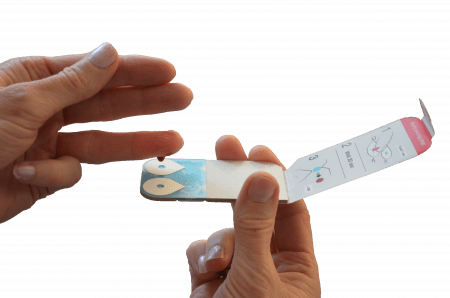Dried blood spot testing is a microsampling method that has been utilised for qualitative or semi-quantitative analysis of hundreds of molecules, including nucleic acids, elements, small molecule drugs, proteins, enzymes and antibodies (1). When applied to blood testing in humans, DBS boasts many advantages over venous blood draws:
- It allows the collection of small quantities of whole blood via fingertip- or heel prick in a minimally-invasive manner without the need for a phlebotomist, thus improving the patient experience and expanding the possibilities for testing in regions where access to trained phlebotomists is limited.
- Once blood is removed from an individual, it is immediately applied to a pre-prepared DBS filter paper for drying, thereby reducing or even eliminating the need for downstream sample preparation.
- DBS samples can generally be stored and shipped under ambient conditions, which facilitates home- and remote sampling and allows laboratories to receive samples from larger geographical areas than would otherwise be possible.
Capitainer®qDBS – A DBS sampling device that ensures consistent blood volumes every single time
In contrast to conventional DBS, the Capitainer®qDBS microsampling device is designed to prevent oversampling, ensuring accurate blood volumes of 10 µl every single time. The device is very user-friendly with an automatic indicator allowing the user to quickly verify that sampling was successful. Capitainer®qDBS also circumvents the hematocrit (Hct) effect – whereby the proportion of red blood cells (erythrocytes) in the blood influences blood viscosity and may impact the accuracy of analysis – because the integrated DBS filter paper disc is pre-cut prior to blood sampling to perfectly fit the wells of a standard 96-well plate, allowing the entire DBS disc to be used for downstream analysis.


